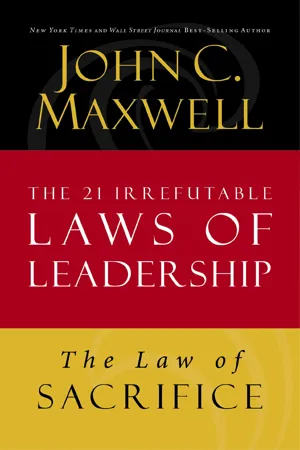
This is a test
- 23 pages
- English
- ePUB (mobile friendly)
- Available on iOS & Android
eBook - ePub
The Law of Sacrifice
Book details
Book preview
Table of contents
Citations
About This Book
He was one of the nation's most vocal critics on government interference in business. So why did Lee Iacocca go before Congress with his hat in his hand for loan guarantees? He did it because he understood the Law of Sacrifice.
Frequently asked questions
At the moment all of our mobile-responsive ePub books are available to download via the app. Most of our PDFs are also available to download and we're working on making the final remaining ones downloadable now. Learn more here.
Both plans give you full access to the library and all of Perlego’s features. The only differences are the price and subscription period: With the annual plan you’ll save around 30% compared to 12 months on the monthly plan.
We are an online textbook subscription service, where you can get access to an entire online library for less than the price of a single book per month. With over 1 million books across 1000+ topics, we’ve got you covered! Learn more here.
Look out for the read-aloud symbol on your next book to see if you can listen to it. The read-aloud tool reads text aloud for you, highlighting the text as it is being read. You can pause it, speed it up and slow it down. Learn more here.
Yes, you can access The Law of Sacrifice by John C. Maxwell in PDF and/or ePUB format, as well as other popular books in Theology & Religion & Christian Church. We have over one million books available in our catalogue for you to explore.
Information
Topic
Theology & ReligionSubtopic
Christian Church
THE LAW OF SACRIFICE
A Leader Must Give Up to Go Up
Why does an individual step forward to lead other people? For every person the answer is different. A few do it to survive. Some do it to make money. Many desire to build a business or organization. Others do it because they want to change the world. That was the reason for Martin Luther King Jr.
SEEDS OF GREATNESS
King’s leadership ability began to emerge when he was in college. He had always been a good student. In high school, he skipped ninth grade. And when he took a college entrance exam as a junior, his scores were high enough that he decided to skip his senior year and enroll in Morehouse College in Atlanta. At age eighteen he received his ministerial license. At nineteen he was ordained and received his bachelor’s degree in sociology.
King continued his education at Crozer Seminary in Pennsylvania. While he was there, two significant things happened. He heard a message about the life and teachings of Mahatma Gandhi, which forever marked him and put in motion his serious study of the Indian leader. He also emerged as a leader among his peers and was elected president of the senior class. From there, he studied for his PhD at Boston University. It was also during this time that he married Coretta Scott.
SEEDS OF SACRIFICE
King accepted his first pastorate in Montgomery, Alabama, at the Dexter Avenue Baptist Church in 1954 and settled into family life when his first child was born the next year in November. But that peace didn’t last long. Less than a month later, Rosa Parks refused to relinquish her seat on a bus to a white passenger and was arrested. Local African American leaders arranged a one-day boycott of the transit system to protest her arrest and the city’s segregation policy. When it was successful, they decided to create the Montgomery Improvement Association (MIA) to continue the boycott. Already recognized as a leader in the community, King was unanimously elected president of the newly formed organization.
For the next year, King led African American community leaders in a boycott with the goal of changing the system. The MIA negotiated with city leaders and demanded courteous treatment of African Americans by bus operators, first-come, first-served seating for all bus riders, and employment of African American bus drivers. While the boycott was on, community leaders organized carpools, raised funds to support the boycott financially, rallied and mobilized the community with sermons, and coordinated legal challenges with the NAACP. Finally in November 1956, the U.S. Supreme Court struck down the laws allowing segregated seating on buses.1 King and the other leaders were successful. Their world was beginning to change.
The Montgomery bus boycott was a major step in the American civil rights movement, and it’s easy to see what was gained as a result of it. But King also began paying a personal cost for it. Soon after the boycott began, King was arrested for a minor traffic violation. A bomb was thrown onto his porch. And he was indicted on a ch...
Table of contents
- COVER PAGE
- TITLE PAGE
- COPYRIGHT
- DEDICATION
- CONTENTS
- ACKNOWLEDGMENTS
- THE LAW OF SACRIFICE
- NOTES
- ABOUT THE AUTHOR